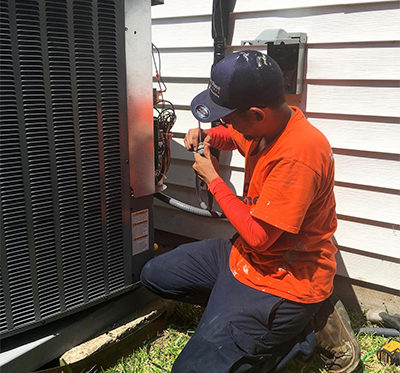Air conditioners may make a range of noises and can become bothersome to your home environment. Thankfully, there are things you can do to reduce that noise while still making your home comfortable. Discover what causes AC noise and ways you can reduce the amount that your unit produces.
What Causes AC Noise
Before exploring how to reduce the noise your AC makes, it’s helpful to understand what’s causing it. Every air conditioner will generate some sound when the fans are running. This will vary from unit to unit based on whether it’s a single-speed or variable-speed fan, its size, age, and more. The compressor will also make noise, which can range from a low to a loud hum. These are the normal noises, but then there are other noises you may have as well.
Your AC may make a rattle, banging, or clanking sound when something comes loose. This can be as simple as the condenser unit fan blades coming loose to more complex issues, like something inside the compressor breaking. The ducts in your system may also cause some of these noises as they flex due to the expansion and contraction when conditioned air moves through them.
Here are some tips to reduce the noise coming from your air conditioner.
1. Get Routine Maintenance
One of the best things you can do for your air conditioner next to changing your air filter is to get routine maintenance. Beyond the difference it makes in cooling performance and efficiency, maintenance goes a long way to reducing the amount of noise your air conditioner makes.
During routine maintenance, your technician will check and tighten your electrical connections and mounting hardware. This helps reduce the amount of rattling your system generates while it’s running. The mounting screws for the condenser unit fan blades and the circulating fan motor are of particular concern. The tighter electrical connections reduce resistance, which can wear on your components faster. Once components like the compressor capacitor or contactor wear, they may start making sounds like a loud buzzing for the capacitor or a loud chattering for the contactor.
Your technician will also clean and balance your circulating fan and lubricate the fan’s bearings if it’s not a sealed unit, both of which reduce the wear on the fan’s motor. Once this wears, you may experience noises like a loud screeching due to worn bearings.
2. Fix Issues Quickly
It is tempting to ignore small problems with your air conditioner, hoping they’re a fluke and that it’ll just happen to start working properly again. Unfortunately, that is rarely the case, and when you let small issues go unresolved, they’ll turn into larger issues fairly quickly.
Small issues can also be a significant contributor to AC noise. These small issues may include the aforementioned contactor and capacitor. When these components fail to work properly, they put additional strain on the compressor, which in turn may burn out and make additional noise like moaning, clanking, banging, rattling, ticking, and rumbling. Addressing these issues not only resolves the immediate sound problem but also helps prevent additional problems that may contribute to newer or worse sounds in the future.
3. Use a Sound Blanket
You may not have heard of them for an air conditioner, but there are special insulating blankets that can help reduce the sound. These are different than the blankets that you’d put on your unit over the winter, which may restrict airflow through the system. Rather, they are specially designed to allow air to flow through.
The key is to find the right sound blanket for your particular unit. Getting a discount aftermarket blanket may sound good and save you some money, but it could also inhibit the airflow through the compressing unit, leading to reduced cooling and potentially significant damage. A sure bet is to see if the unit’s manufacturer sells a sound barrier blanket. If not, work with your trusted HVAC provider to recommend a brand that’ll dampen the sound without restricting or inhibiting airflow.
4. Create a Sound Barrier
Aside from a sound blanket that goes directly on your unit, you can also dampen the sound with any number of barriers. Some people prefer erecting a fence, while others prefer something a little more aesthetically pleasing, like shrubs or other plants. The goal is to find something that is solid enough to prevent the sound waves from passing. If you choose plants, you may need to wait several years for them to grow to a substantial enough size to block the sound. If you’re using fencing material, you’ll want to use something solid that won’t reverberate when sound hits it. You may consider something like an MLV barrier, which stands for mass-loaded vinyl and can be installed either inside your home or as a lining to a barrier fence.
Regardless of what kind of barrier you choose to use, you want to make sure that it doesn’t impact the system’s performance and your ability to have it serviced. Keep it at least 3 feet away from the unit on all sides. Consider leaving the top open or installing it at least 5 feet above the unit. If you use shrubs or other plants, plan to trim them frequently to provide adequate clearance.
5. Consider the AC’s Location
The location of your system is also important, both for the indoor and outdoor units. Most indoor units are placed in the basement to reduce the sound in the rest of the house. However, if you don’t have a basement, then plan to have it installed in an area that provides some distance between it and your main living spaces. It’s best if you can install it outside a utility or laundry room. If you’re replacing your current unit, talk with your installation company about whether it makes sense to relocate it outside your home.
6. Update Your Air Conditioner
An air conditioner will slowly lose its performance as it ages, which includes running more loudly. Further, newer models may be quieter than what you currently have. If your unit is over 10 years old, you may want to consider replacing it, especially if you’ve had several repairs in the last two years.
When exploring your options, consider a higher-efficiency system, which includes a variable-speed fan and a two-stage compressor. These systems run on the lower setting about 75% of the time, which both reduces the noise they produce and the energy they consume.
When people around Garland need heating and cooling services they can trust, they’ve turned to On Time Experts since 1981. Our experts provide heating and air conditioning maintenance, repair, and installation. We also off together with a wide range of plumbing, including repair, camera inspections, water heaters, and sump pumps. You can also count on us for indoor air quality solutions like duct cleaning, air purifiers, and dehumidifiers. Call to schedule your AC consultation with one of our trusted technicians today.

